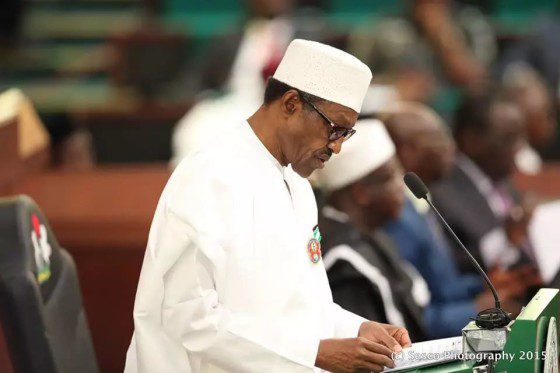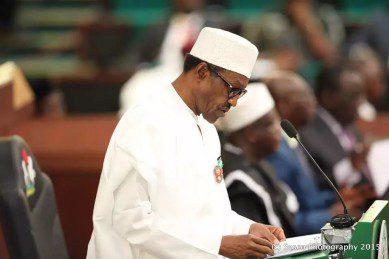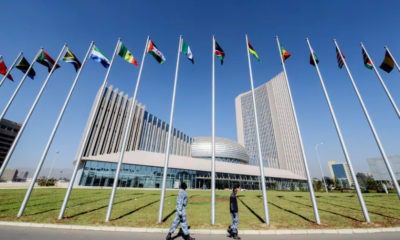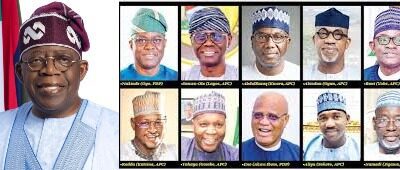Economic Issues
Achieving Positive Change In a Tanking Economy -By Taiwo Adekinle


Dear Mr. President,
Achieving Positive Change in Face of Dwindling Forex Revenue and Reserve: Pathways to Nigeria’s Economic Recovery in the Medium to Long Term
Aware that you were away on a six-day vacation, I decided to write this letter to coincide with your official resumption of duties, so it could prompt you to action. Many may not understand the reason for your vacation, especially at this time when the nation battles painful revenue depletion, reserves strain and little economic growth. But I understand you sir. I can really understand that you needed the vacation after seeing the kind of mess gold-fingers within the presidency have done to the 2016 appropriation bill currently before the Senate.
Unbelievable allocation figures that have sprung up in the budget for unimaginable expenditure items could really raise one’s blood pressure. Trust me, no one with good intentions for Nigeria as you do, would not need a break following the kind of embarrassment and taint the 2016 bill is already causing your administration. More dazing are the kinds of outrageous items that have been smuggled into the appropriation bill by some supposedly trusted people within the presidency and in some agencies of government. I know that it is hard to believe that N6.2 billion (about 31.2 million USD) was allocated for research in the ministry of “interior”, even as the nation groans under the impact of the massive shrinking of oil revenues, which makes up over 70 percent of our national income and foreign exchange earnings! Does this research item in the ministry’s expenditure budget cover space technology projects?
The 2016 appropriation bill has created such national mess that even the Senate is also considering taking a break. Baba, I am writing you and respective members of your cabinet with a deep feeling of displeasure. This is because the jubilation that ushered in your administration has since waned and gone totally cold with the feeling of frustration now pervading the air. Many people are angry about the forex tightening measure due to plummeting dollar revenues, and are quick to ventilate their anger at the restrictive policies relating to the access to dollars required to pay for their many imports and foreign expenses. The demand for dollars has become much higher than what we earn nationally due to the crash in global oil prices, as we all know. Many of these angry Nigerians are also similarly quick to agree that although the devaluation of the naira would bring only a little respite by seeing some dollar savings, it would ultimately hurt the economy and yet does not solve the problem of increasing dollar demands. This letter is to kindly request that you consider some recommendations to the present economic conundrum that our nation is faced with.
For a country’s long-term economic survival, local industries (in terms of purchasing power/currency) must be protected and aided with proper incentives and a functional manufacturing environment (in terms of infrastructure, supporting businesses) for their products to be internationally competitive, and to sufficiently maintain a positive balance of trade over the long-term.
Every developed nation that has become industrialised towed a similar path before arriving at its present position. The devaluation of the naira would not solve our economic problems; it neither addresses the medium or long-term, nor provides a sustainable solution.
Hence, in order for us to arrive at our desired destination of self-sufficiency, industrialisation and economic progress, we must explore and develop other natural resources and raise our human capital as a people going forward. We need to begin to look at building the industries that would adequately explore other natural resources that our nation is commercially blessed with beyond oil. Also, we need to note that while the government sets out to explore these resources, the rights of indigenous people (IP) to their ancestral lands must equally be protected and respected, and they must be part of negotiations with governments and corporations, ensuring that their free prior informed consent (FPIC) is given according to international law, standard protocol and practices. Basically, they have the rights to directly enjoy the fruits of their ancestral land. Usually the government gives some mining rights and licenses to IPs. They in-turn use these mining rights to attract foreign or local investments to operate on their behalf and pay them royalties, while equally paying taxes to the government.
Now to the more pressing challenge of our depleting USD reserves due to local demand pressure. The federal government must be ready to strategically and pragmatically deal with the forex challenges the economy is facing.
To do this, strategic actions must be carried out by the finance ministry and other connected organs of government. This letter highlights a number of possible medium-long term solutions to deal with the current economic crisis our nation is plagued with.
First, in order to address the devaluation issue for now, we must clearly cut out distinctions between the pros and the cons of the naira valuation debate to enable us arrive at the most logical and fairly sustainable course of action. I have a firm view that the devaluation isn’t necessary, but to get some forex into the nation and satisfy pro-devaluation campaigners, the MPC could for now propose a devaluation of within a N3 naira margin.
Finding a lasting solution means we have to connect the missing dots that lay in cutting imports, growing our manufacturing strength, improving (human capital) local skills and capacity for us to be internationally competitive as a nation.
The problem we have at the moment in Nigeria is not an inadequacy of naira but that of the U.S dollar. Our thought should then be: can we shore up the dollar with the abundant naira we have locally? This is where economic stimulus from the CBN comes into play. They must inject funds through the commercial banks to stimulate local economic growth through the funding of new start-up businesses that can have most or all of their inputs/raw materials sourced locally, and expand existing businesses in the real sector.
Mr. President, you may have to instruct the CBN to issue a directive to commercial lenders to aggressively pursue genuine entrepreneurs and new innovative businesses/ideas that can be funded and developed to meet international competitiveness and required commercial viability. This fiscal policy would be effective through proper regulation and monitoring of commercial lenders by the Central bank.
There is need to cut interest rates also to stimulate growth in the real sector of the economy.
Commercial banks must jettison the habit of investing in treasury bills, a lazy and comfortable way for the banks to invest funds, which gives them guaranteed returns on investment at the detriment of viable start-ups/portfolios that badly need “naira” capital. Our commercial banks must be made to act in the interest of broader economic growth. The banks, as they are currently structured, favour the funding of huge projects (e.g the Dangote group refinery project) that should naturally attract its own forex inflow from abroad considering the size of such projects. What one finds is that our commercial banks are jostling for the top financier position for these kinds of project running into several of the much needed billions of dollars and naira for the wider economy. Such large project should attract its own forex from abroad in the form of Foreign Direct Investment (FDI).
These banks are in the habit of favouring special interests and specific sectors, especially the oil and gas, and now that oil prices have plummeted, the whole economy is in distress. We all bear the burden of our commercial bank’s lopsided business interests and our national failure in many non-oil sectors that can produce finished exportable products which could have helped cushion the kind of strains the nation’s dollar reserve is currently experiencing.
The other day, the CBN was giving assurances to the Dangote Group that it would help provide $6 billion USD for its Lekki refinery project. What is the CBN’s business with that? Is that what the bank was established for according to the act of parliament? We have gotten many things all wrong as a people and we must go back to doing things right in order to make an headway.
A huge hole in our forex reserve is the 40 percent of nationally earned dollars which is being used for the importation of refined petroleum products. This forex gap could have been smartly avoided if successive governments took proper steps to ensure we refine our crude oil locally rather than returning such substantial percentage of foreign exchange earnings to the international market for the purchase and importation of refined petroleum products.
In the medium term, to cushion the effect of the 40 percent galactic hole in our dollar purse, the government must look at ways to smartly balance trade with counterparts in Europe and Asia. Importer/marketers can buy refined products from other countries that have them for sale in commercial quantity and pay in their local currencies to reduce the demand pressure on the USD. We need to reduce dependence and demand for one particular currency ($) by maintaining a controlled reserve of other currencies accepted in countries where our major imports can be sourced.
We can make imports of some items from other countries where we can pay for finished products in GBP, Euros, or Yuan. We must explore ways to reduce vulnerable dependence on the U.S dollar by strategically maintaining trade balance in other currencies. For example, maintaining a projected balance of funds in “baht” (Thai currency) for the importation of rice from Thailand could assist the CBN and finance ministry to provide some cushion to USD demand. Therefore, all rice import is made from Thailand and paid for through that country’s currency (baht) reserve with the CBN. This would apply for product categories accounting for the highest dollar demands.
The CBN has a lot of work to do here. Since we are importing a lot from China, the CBN can maintain some foreign exchange reserves in Yuans to satisfy imports from that market. We would have to deal with countries we do some level of significant trade with in this regard, so as to pull in adequate funds in their local currencies to satisfy the payment of imports from these countries. The proceeds of export to such countries could also be received in their local currencies, and we can calibrate the trade balances as we go along. France would be happy to pay for crude oil in Euros and we, in turn, could use these Euro earnings to balance imports of refined product from that country and possibly all other imports from the EU. These are possible solutions for the medium term. On the long term, where we would want to be is in green industrialisation, agricultural revolution, economic diversification and self-sufficiency.
On a final note Mr. President, we must reduce our importation from the U.S, as they refused to sell weapons to us when parts of our nation were ravaged by ragtag Boko Haram terrorists. This could be because they so badly wanted their doomsday prediction of Nigeria disintegrating in 2015 to come to reality. Well, we have overcome; we have ridiculed their prediction and remained united as a nation.
We have so far managed to dodge all time-bombs and landmines placed before us as a nation, except for the current economic woes due to dwindling oil revenue and increasing dollar demand on our fx reserves. The truth is that the U.S has been unfair to us. Not long ago their Secretary of Commerce came to Nigeria complaining that American businesses are hurt by the forex restrictions in the country; but is our real sector not more badly hurt? We cannot even produce tomato paste in Nigeria. The U.S is a developed nation, we are not. They must allow us develop. Sir, the fact of the matter is that they don’t really care about us!
As the religious people that we are known to be, I would like to remind you, Mr. President, of Primate Ayodele’s 2016 prophesy, in which he warned against believing everything the U.S tells you. Please take note of that sir.
This letter is written because I am one of those eager to see positive changes in our dear nation, and to see it rescued and retrieved from the claws of the economic woes which have befallen her as a result of decades of accumulated mismanagement and little innovation on the part of government. There are lots of PPP documents that could create several jobs and improve the lives of our people, yet they lay unattended to and covered in dust for many months, and some have been on the tables of federal and state government officials for years. These officials are all guilty of this. What are they doing about these documents? The Nigerian civil service definitely needs a revamp.
Mr. President this is a wake-up call to you and your economic team. Nigerians are getting tired of waiting for the change you promised to come. Today, the youths are unhappy; they have no jobs, yet further decline in the job market looms, raising greater concerns and dashing the hopes of many. There is barely any good practical education in the country; inadequate infrastructure; no incentives for innovation; very few opportunities for start-ups to thrive; no world-class ICT/programming and software development training for smart and computer savvy Nigerian youths. Nothing seems to have been done to improve the lot of many in the society so far, Mr. President. The youths are angry; they are the leaders of today and not tomorrow. Many of us played no small part in ensuring that you come to power. We vigorously campaigned and fought the now opposition party. We were fueled by our belief in your personal integrity and antecedent as a former military head of state; we still do. We would have loved to see a better representation of youths in your cabinet, but this has not been the case. What we have today is a recycling of old and tired hands. Nigerian youths are saying they want their country back; they are eager to inject their fatherland with new life and fresh ideas to make things work again and move the nation towards long-term sustainability, self-sufficiency and national prosperity. Please kindly help in making this a reality for the benefit of a worthy present day and future for our dear country and people. I am trusting that you would heed some of the advice I have humbly offered here.
May God continue to bless you, and the Federal Republic of Nigeria.
Taiwo Adekinle is the founder of Economic Strategy Group (ESG), an organisation poised with proffering political and economic solutions to challenges faced especially by developing economies.



















